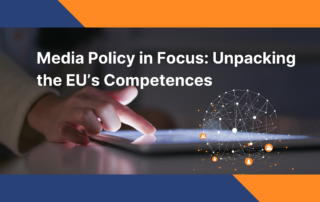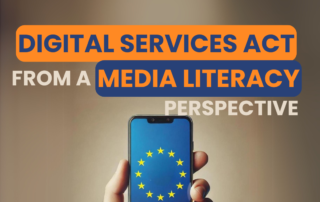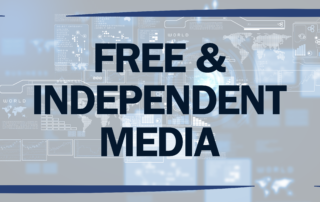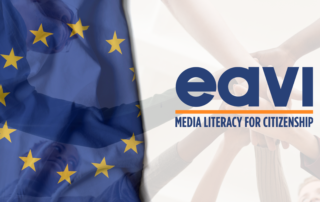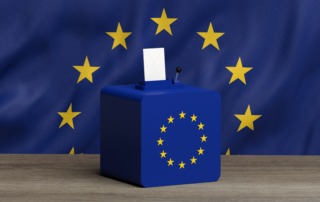Media Policy in Focus: Unpacking the EU’s Competences
What the EU is doing? The European Union’s role in shaping media policy across its member states continues to evolve, balancing cultural diversity with economic interests in an increasingly digital world. Recent developments have highlighted the complexities and controversies surrounding the EU’s competencies in this area while also underscoring the growing importance of media literacy. The EU’s authority in media policy stems from various articles of the Treaty on the Functioning of the European Union (TFEU), as the treaties need to provide direct powers in audiovisual and media policy. This approach allows the [...]
Digital Services Act from a Media Literacy Perspective
Digital Services Act and Media Literacy The Digital Services Act claims to be marking a new era of digital regulation in Europe, aiming to create a safe digital environment for users while keeping the platforms accountable. DSA: A new era As of August 25th, 2023, especially "very large online platforms" (VLOP) such as Google, Meta, X and YouTube, together with other digital services, must comply with the EU's legislative framework to continue to be present in Europe to create a safer digital experience for users through the Digital Services Act (DSA). DSA states [...]
The EU’s Approach to the Evolving Threat of Disinformation
The current availability of mass information has given us great benefits, including increased global connection and broad access to different viewpoints. With information readily accessible at our fingertips, knowledge is widespread and access to information is democratized. However, tools like the internet have also created new and evolving technological vulnerabilities, a process that can potentially damage democratic structures and human rights. The threat of disinformation has taken the spotlight recently, as technological advances in social media platforms and AI are rapidly developing. In the study “The impact of disinformation on democratic processes [...]
The European Media Freedom Act: A Crucial Step Taken Towards Media Literacy
Independent media play a vital role in creating a public discourse, influencing public opinion, and ensuring accountability of those in positions of authority. It is considered as “a public watchdog” and “a key pillar of democracy. Therefore, the EU places significant emphasis on it and stands as a strong advocate for the existence of free and independent media on an international level. Simultaneously, there are growing concerns within the EU. The Commission has been closely monitoring these developments using tools such as the Rule of Law Report and the Media Pluralism Monitor. The [...]
EAVI’s Pioneering Role in Advancing Media Literacy in the EU
At EAVI, we are pleased to observe that the Communication from the Commission dated February 2023, titled “Guidelines pursuant to Article 33a(3) of the Audiovisual Media Services Directive on the scope of Member States' reports concerning measures for the promotion and development of media literacy skills”, acknowledges the studies conducted by EAVI. These studies are referred to as useful resources to assist the Member States in evaluating media literacy levels. We appreciate the recognition of our efforts in contributing to the advancement of media literacy initiatives. Indeed, media literacy is an important subject [...]
The Threat of AI-Generated Disinformation to European Elections and Democracy
In view of the elections that will be held in 2024 in the EU and other parts of the world including the US and UK, there are various challenges to democratic processes as technological advancements are on the rise. It is argued that electoral periods and times of political crisis serve as fertile ground for the production and dissemination of AI-generated content, heightening concerns about the impact on public perception and democratic processes. Recent instances have demonstrated the alarming potential of AI to enable the production of deceptive narratives, with such disinformation finding [...]
Are you aware of your Digital Footprint?
Recently, EAVI and the European Digital Learning Network (DLEARN), in collaboration with Prof. Przemek Sękalski of the Technical University of Lodz, worked together in developing an EU survey that analyses citizens awareness regarding their digital footprint. The survey aims to analyse how much control participants exercise over this digital footprint and how much control they wish they could have as well are looking at the safety aspects they would like to see in place in the future! The aim is to study the results to highlight potential areas in education and training that could be [...]
Digital citizenship needs to be a group effort
The following article was written by Sarah Stoeckl, senior project manager in the ISTE Standards Department. She worked as a writing and literature teacher before becoming an administrator, writer and project wrangler. A student shares his email password with a friend, who shares it with another friend, who sends an inappropriate picture to everyone in the students’ contacts list. It was a joke! But that doesn’t mean there won’t be repercussions. Who failed to teach these kids password safety and email etiquette? Another student wants to fund a film project that combines digital art with music. [...]
Happy GDPR Day!
The GDPR has come into force across Europe today, and with it come sweeping changes to the way the personal data of individuals is processed, retained and used. The most obvious indication of its impact is a bulk of messages from every mailing list, store card, chat room and internet service you signed up for ever. Like many others, I’m considering it a mass unsubscribe from a heap of services I no longer use. The emails are consigned to the trash folder with only second thought being, “when did I sign up for that…?” As [...]
European Commission: Fake News and Online Disinformation
The European Commission has published its High Level Expert Group (HLEG) Report to advise the EC on fake news and disinformation online.

